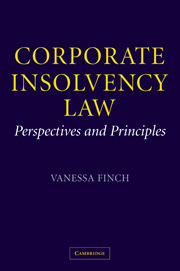Book contents
- Frontmatter
- Contents
- Acknowledgements
- Table of cases
- Table of statutes and other instruments
- List of abbreviations
- Introduction
- Part I Agendas and objectives
- Part II The context of corporate insolvency law: financial and institutional
- Part III The quest for turnaround
- Part IV Gathering and distributing the assets
- 12 Gathering the assets: the role of liquidation
- 13 The pari passu principle: when everyone is equal?
- 14 Bypassing pari passu
- Part V The impact of corporate insolvency
- Conclusion
- Bibliography
- Index
14 - Bypassing pari passu
Published online by Cambridge University Press: 05 June 2012
- Frontmatter
- Contents
- Acknowledgements
- Table of cases
- Table of statutes and other instruments
- List of abbreviations
- Introduction
- Part I Agendas and objectives
- Part II The context of corporate insolvency law: financial and institutional
- Part III The quest for turnaround
- Part IV Gathering and distributing the assets
- 12 Gathering the assets: the role of liquidation
- 13 The pari passu principle: when everyone is equal?
- 14 Bypassing pari passu
- Part V The impact of corporate insolvency
- Conclusion
- Bibliography
- Index
Summary
The main potential bases for supporting pari passu as a principle of corporate insolvency law are that it provides an efficient and fair ground rule for allocating the insolvency estate. As was seen in the last chapter, however, exceptions to pari passu produce a principle that is unduly complex and uncertain. This chapter considers the extent to which pari passu can be bypassed and a central issue will be whether bypassing is so easily and frequently practised that the value of pari passu is undermined. Here, therefore, we return to the second of the two key problems that corporate insolvency law faces in this area: how a company's insolvent estate is to be constructed.
As a preliminary point it should be emphasised that the law does not readily countenance contracting out of collective arrangements for dealing with the insolvency estate. It was noted in chapter 13 that parties may be allowed by the courts to enter into contracts in a manner that worsens their status in the distribution of an insolvent company's estate. What the courts will not do is allow creditors to ‘contract with [their] debtor [to] enjoy some advantage in a bankruptcy or winding up which is denied to other creditors’. The House of Lords made it clear in the British Eagle case that this would be contrary to public policy whether or not the contractual provision was expressed to take effect only on insolvency.
- Type
- Chapter
- Information
- Corporate Insolvency LawPerspectives and Principles, pp. 450 - 492Publisher: Cambridge University PressPrint publication year: 2002
- 1
- Cited by



